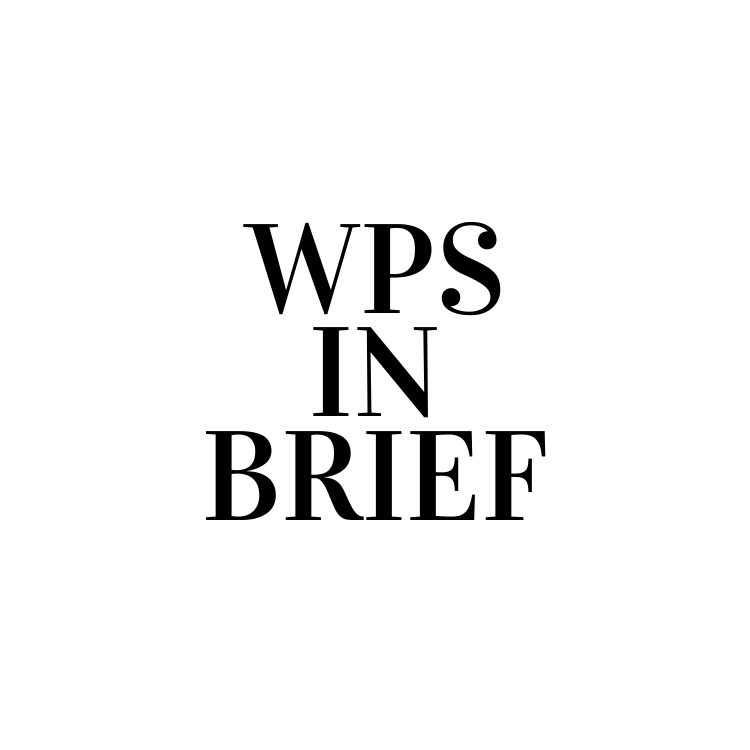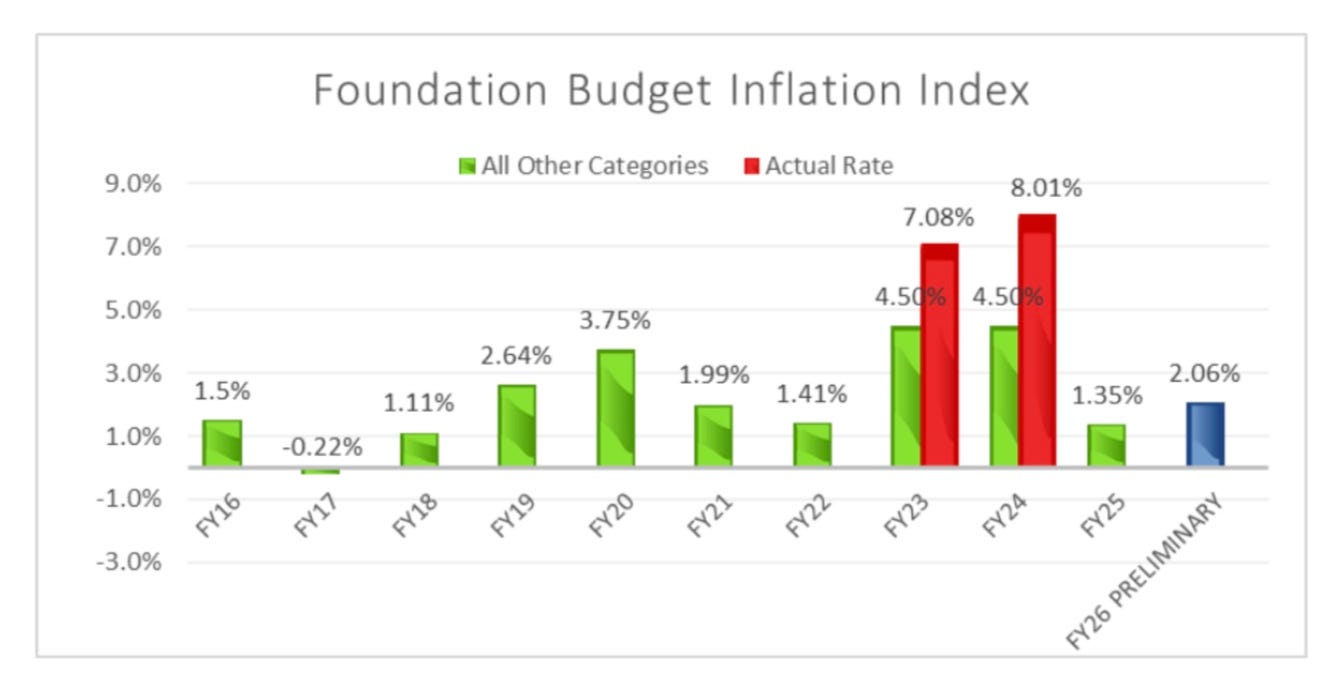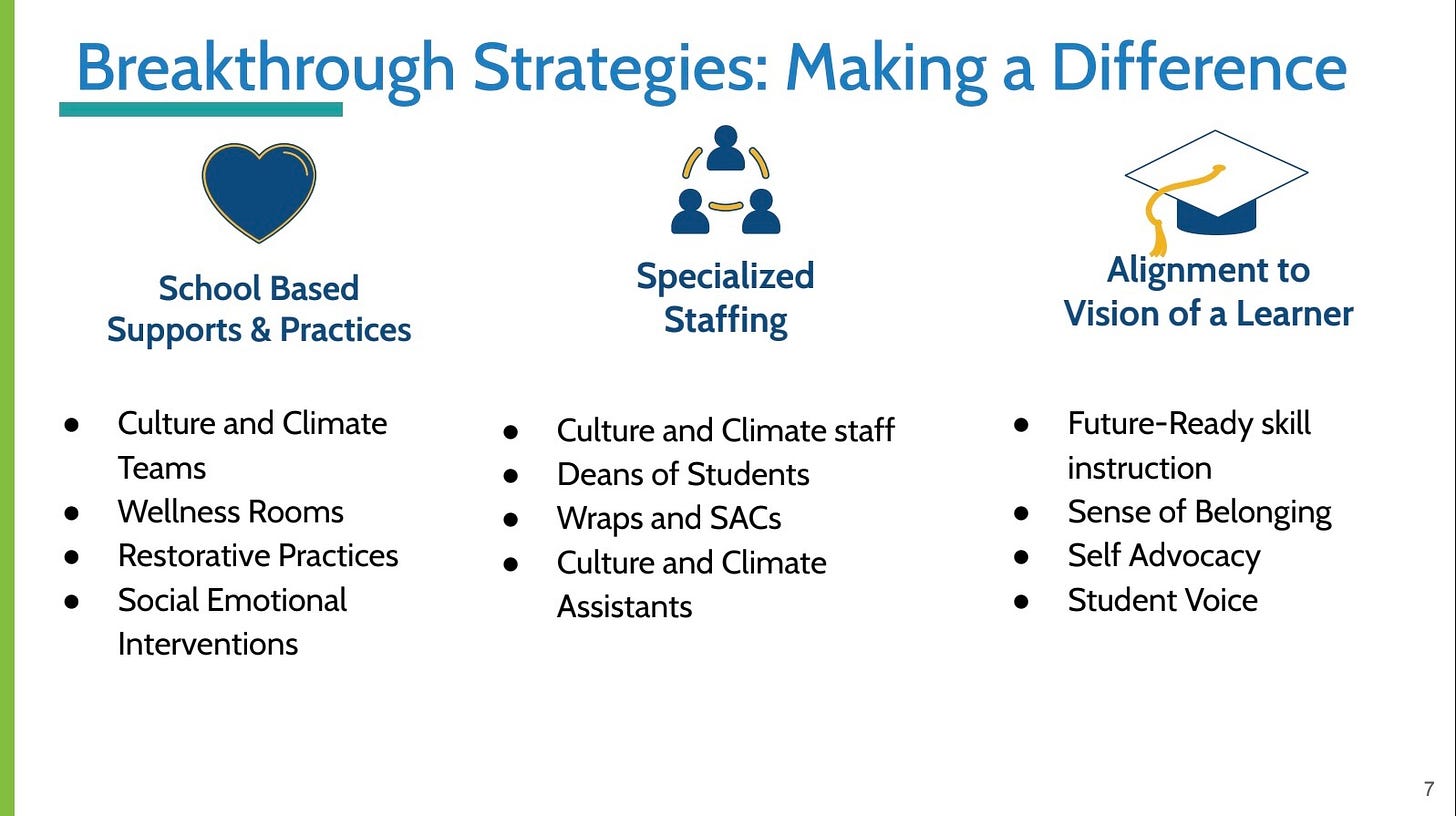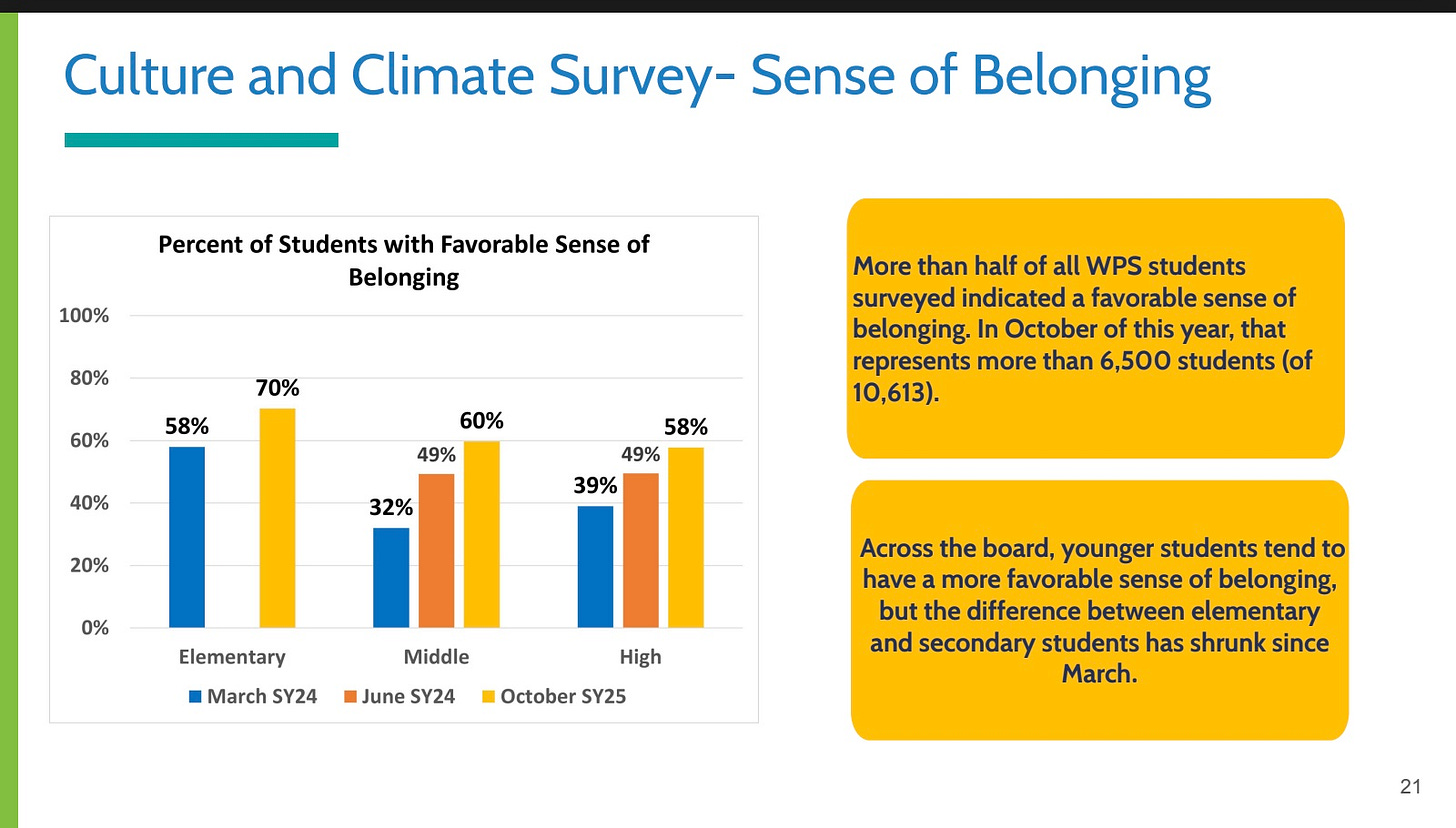WPS in Brief: November 2024
Inflation impact, school boundary changes, honors programs and equity
Bill here with a quick announcement: We’re running a Thanksgiving deal for 30 percent off a yearly paid subscription, along with a 20 percent discount on merch for paid subscribers.
WPS In Brief is one of four columns supported by Worcester Sucks subscribers! As a 100-percent reader supported publication, every subscription counts. To be a paid subscriber makes you a patron of valuable, in-depth local coverage like that which you’re about to read!
Now to Aislinn…
Welcome to the November issue of WPS in Brief. This month’s post covers key topics from two school committee meetings and two standing committee meetings.
Let’s get to it:
Inflation Factor.
I’m starting off with a boring topic, but probably the most important: the inflation rate that impacts how our district gets funded. At the November 18 Finance, Operations, and Governance (FOG) subcommittee meeting, Deputy Superintendent Brian Allen discussed the preliminary estimate for the inflation factor for next school year, which is 2%. Based on the Implicit Price Deflators for Gross Domestic Product, State, and Local Government, the inflation factor is one (of three) major components to the funding formula used by the state to decide how much aid a district gets (the others are student enrollment and Student Opportunity Act Funding). Worcester gets the majority of its funding from the state, so while the inflation factor is higher than last year, 2 percent still isn’t great. It’s still too early to say exactly how much that will impact the budget for next year.
The committee also discussed how the inflation factor is capped at 4.5 percent by the state, so even in years that inflation is higher, districts will not get more. If you look at the chart above, that’s what happened for the 2022-2023 and the 2023-2024 school year. Each 1 percent is about $1 million, so that’s $30 million dollars over those two years that the district lost––that’s equivalent to 300 teaching positions. Allen said the committee can do some helpful advocacy here: ask the state to make up that gap in future years with less inflation. For example, in a year like last year, when the rate was 1.35%, the state could have made up the 3% gap from the year before and still given districts a 4.5% inflation rate.
Elementary Language Arts Curriculum.
The superintendent’s report for the November 14 school committee meeting was on the new elementary school language arts curriculum, CKLA Amplify. The curriculum was purchased at the start of last school year, so this is the second year of implementation. This is the first time WPS elementary school teachers have had a comprehensive K-6 English Language Arts curriculum that is consistent across all schools. The presentation gave an overview of the curriculum and also outlined how the multilingual department has created alignment maps for English learners with targeted goals and multilingual supports by week.

After the presentation, Jermaine Johnson (district F) commented that he would have liked to hear more from teachers and how the district has assessed and augmented the curriculum with respect to cultural responsiveness, a concern raised when the school committee first approved the curriculum. (The founder of the CKLA Foundation, which publishes the curriculum, is E.D. Hirsch, who has a particular educational philosophy centered around the core cultural knowledge all Americans should have). Assistant Superintendent Dr. Marie Morse mentioned that one of the first things the district did was to have teacher teams review the curriculum and they removed a few sections that they felt “weren’t the best fit for our students.” The district is also working on a curriculum equity tool for teachers to help them understand what bias in curriculum looks like.
School Boundary Changes.
For over a year Superintendent Monárrez and Deputy Superintendent Brian Allen have spoken about the need for redistricting school boundaries, which currently follows a neighborhood model (except for the vocational programs, arts magnet programs, dual language programs and the honors programs). There was an item on the agenda for the November 21 school committee meeting requesting the school committee “consider possible revisions to school boundary assignments.” According to the district report, WPS has not comprehensively reviewed boundary changes in decades despite changing enrollment trends. According to the proposed timeline from the district, recommendations would be made in the 2025-2026 school year to allow for public hearings, and implementation would happen in the 2026-2027 school year. You can see the boundaries as they currently stand (and how socioeconomically segregated our schools are) using this great Worcester Regional Research Bureau tool.
Honors Programs.
At the November 19 Teaching, Learning and Student Success subcommittee meeting Director of College and Career Readiness Chris Kursonis gave a presentation on the new upcoming honors program at Doherty High. The program will have a biomedical focus and will be open to incoming ninth graders. Students are selected based on STAR test scores, although it’s not clear to me if this is based on just one sitting of the STAR test, or if students have the opportunity to take it more than once for honors program eligibility. Considering the district has criticized the MCAS, it is a bit hypocritical to base entry on a single standardized test.
School committee member Maureen Bineinda (at-large) said she was happy to see this program come to fruition and that “these programs were started to keep our gifted children in our community.” Sue Mailman (at-large) raised concerns that the honors programs are not following similar acceptance criteria as the vocational programs, like having allocations by quadrant, for example.
Looking at demographic data reported back in April for the Burncoat Hanover Honors program and the Goddard Scholars honors program, enrolled students in those programs do not reflect the WPS student body and disproportionately come from the Burncoat and Doherty quadrants.
Here’s Goddard:
And here’s Hanover:
The one data point not included here, but I would be interested in seeing, is how many students are low-income vs. non-low-income. I am disappointed to see a new honors program starting without the district implementing a more equitable selection process.
Sense of Belonging: School Culture and Safety.
The report of the superintendent for the November 21 school committee meeting was on student sense of belonging, discipline, and physical safety. Tying it back to the strategic plan the presentation went through the school-based supports and practices that the district has put in place at the secondary level with:
climate and culture specialists: paraprofessionals whose role it is to build relationships with students and diffuse situations
wellness rooms: a place for students to go when they need space to regulate
restorative practices: moving towards building community and repairing relationships
The presentation also touched on physical safety, including an overview of the I Love You Guys standard response protocol and the drills required at schools: bus, medical, lockdown, hold, and secure drills are twice a year each; fire drills are once a month.
Then, Dr. Andrew Lampi of the research office went over October survey data asking students about their sense of belonging, and as you see above, there was an uptick at all school levels compared to March of last year.
The school committee discussion focused on discipline, especially Maureen Binienda (at-large), who said that “restorative practices do not work in all schools.” She suggested that “there are constant fights” and that more punitive approaches are warranted, like increasing out of school suspensions or making suspensions longer. Superintendent Monárrez made a passionate moral and research-based argument for restorative practices, saying, "I will not be a superintendent that throws children away. Not one single child.” It’s worth a watch:
And finally, it is Jermaine Johnson, the sole parent on the school committee and a social worker, who speaks up again about the unconstructive culture of the committee (as he did in April and June) and calls out his fellow school committee members to do better.
Bits and bobs.
In a continued trend over the last few years, requests for McKinney Vento transportation for homeless students is increasing—with 132 new requests this school year—and it is expensive for the district as they have to contract out for some of the drivers. Another example of how high housing costs don’t just impact individuals, but costs our city budget too.
Ex-city councilor Frederick Rushton spoke for five whole minutes on his petition to add pickleball to the middle school sports offerings. Showing once again, the same rules don’t apply to everyone. When I spoke as a petitioner on behalf of a school site council about bus safety and requesting bus monitors, I was cut off for going over the two minutes.
The transportation department is working on fixing the MyStop app, where a technical glitch with ipads has been overriding how the app collects GPS data from the buses and is creating lag time for families tracking buses. The first year of its use, in 2022-2023, a very small percentage of buses had ipads, which is why it worked so well that year. They hope to have it resolved soon.
Recommended Reads.
Worcester School Committee member wants crackdown on vaping.
Worcester schools tout lower suspension rates, improved school safety.
Upcoming Dates.
School Committee Meetings are December 5 and 19, 6 p.m. at City Hall
Citywide Parent Planning Advisory Council, December 11, 6 p.m. at Worcester Tech.
Finance, Operations & Governance (FOG), December 16, 5 p.m. at Durkin Administration Building
Teaching, Learning and Student Success (TLSS), December 12, 5 p.m. at Durkin Administration Building
Also.
THE DISTRICT NEEDS SUBSTITUTE TEACHERS. When a teacher is out and a principal does not have a sub available, kids get divided up and spread around the building. That usually means students sit on their laptops all day and there isn’t much learning taking place. This has been happening more this year, due to the elimination of building subs. Not much principals can do if they don’t have people to cover classrooms. So apply to sub! You can make $110 a day, and maybe teach our kids a thing or two.
As always, email me with feedback and questions at aislinn.doyle@me.com.
The 30 percent off subscription deal runs til next Thursday.
Don’t forget to tip your writers folks!
And if there’s a WPS parent in your life that you think should be reading these, please share!







